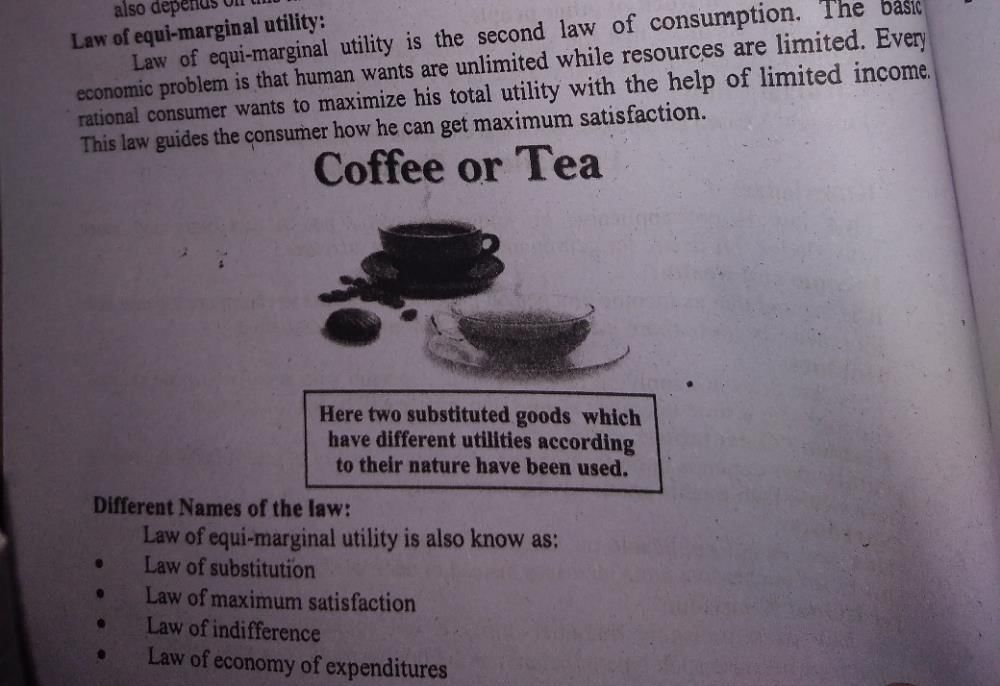Commerce Exam > Commerce Questions > Law of equi marginal utility?
Start Learning for Free
Law of equi marginal utility?
Most Upvoted Answer
Law of equi marginal utility?
Law of Equi Marginal Utility
The law of equi marginal utility is an important concept in the field of economics. It states that for a rational consumer, the marginal utility that is derived from each additional unit of a good or service consumed will be equal, as long as all other factors remain constant.
Explanation
This concept is based on the assumption that consumers will always attempt to maximize their satisfaction or utility from a given set of resources. In order to do this, they will allocate their resources in a way that maximizes the total utility derived from each unit of the resource.
To understand this concept better, consider the following example. Suppose a person has $10 to spend on either apples or oranges. The marginal utility of the first apple is 10, while the marginal utility of the first orange is 8. This means that the person will choose to buy the apple, as it provides more satisfaction for the same amount of money.
However, as the person continues to consume more apples, the marginal utility of each additional apple will decrease. Eventually, the marginal utility of the last apple consumed will be equal to the marginal utility of the last orange consumed. At this point, the person will be indifferent between buying an additional apple or an additional orange.
Implications
The law of equi marginal utility has several important implications for businesses and consumers alike. For businesses, it suggests that they can maximize profits by producing goods and services up to the point where the marginal cost of production is equal to the marginal revenue generated by the last unit sold.
For consumers, the law of equi marginal utility suggests that they can maximize their satisfaction by allocating their resources in a way that equalizes the marginal utility derived from each unit of the resource.
In conclusion, the law of equi marginal utility is a key concept in economics that helps to explain how consumers and businesses allocate their resources in a way that maximizes satisfaction and profits, respectively.
The law of equi marginal utility is an important concept in the field of economics. It states that for a rational consumer, the marginal utility that is derived from each additional unit of a good or service consumed will be equal, as long as all other factors remain constant.
Explanation
This concept is based on the assumption that consumers will always attempt to maximize their satisfaction or utility from a given set of resources. In order to do this, they will allocate their resources in a way that maximizes the total utility derived from each unit of the resource.
To understand this concept better, consider the following example. Suppose a person has $10 to spend on either apples or oranges. The marginal utility of the first apple is 10, while the marginal utility of the first orange is 8. This means that the person will choose to buy the apple, as it provides more satisfaction for the same amount of money.
However, as the person continues to consume more apples, the marginal utility of each additional apple will decrease. Eventually, the marginal utility of the last apple consumed will be equal to the marginal utility of the last orange consumed. At this point, the person will be indifferent between buying an additional apple or an additional orange.
Implications
The law of equi marginal utility has several important implications for businesses and consumers alike. For businesses, it suggests that they can maximize profits by producing goods and services up to the point where the marginal cost of production is equal to the marginal revenue generated by the last unit sold.
For consumers, the law of equi marginal utility suggests that they can maximize their satisfaction by allocating their resources in a way that equalizes the marginal utility derived from each unit of the resource.
In conclusion, the law of equi marginal utility is a key concept in economics that helps to explain how consumers and businesses allocate their resources in a way that maximizes satisfaction and profits, respectively.
Community Answer
Law of equi marginal utility?


|
Explore Courses for Commerce exam
|

|
Question Description
Law of equi marginal utility? for Commerce 2025 is part of Commerce preparation. The Question and answers have been prepared according to the Commerce exam syllabus. Information about Law of equi marginal utility? covers all topics & solutions for Commerce 2025 Exam. Find important definitions, questions, meanings, examples, exercises and tests below for Law of equi marginal utility?.
Law of equi marginal utility? for Commerce 2025 is part of Commerce preparation. The Question and answers have been prepared according to the Commerce exam syllabus. Information about Law of equi marginal utility? covers all topics & solutions for Commerce 2025 Exam. Find important definitions, questions, meanings, examples, exercises and tests below for Law of equi marginal utility?.
Solutions for Law of equi marginal utility? in English & in Hindi are available as part of our courses for Commerce.
Download more important topics, notes, lectures and mock test series for Commerce Exam by signing up for free.
Here you can find the meaning of Law of equi marginal utility? defined & explained in the simplest way possible. Besides giving the explanation of
Law of equi marginal utility?, a detailed solution for Law of equi marginal utility? has been provided alongside types of Law of equi marginal utility? theory, EduRev gives you an
ample number of questions to practice Law of equi marginal utility? tests, examples and also practice Commerce tests.

|
Explore Courses for Commerce exam
|

|
Signup for Free!
Signup to see your scores go up within 7 days! Learn & Practice with 1000+ FREE Notes, Videos & Tests.



















